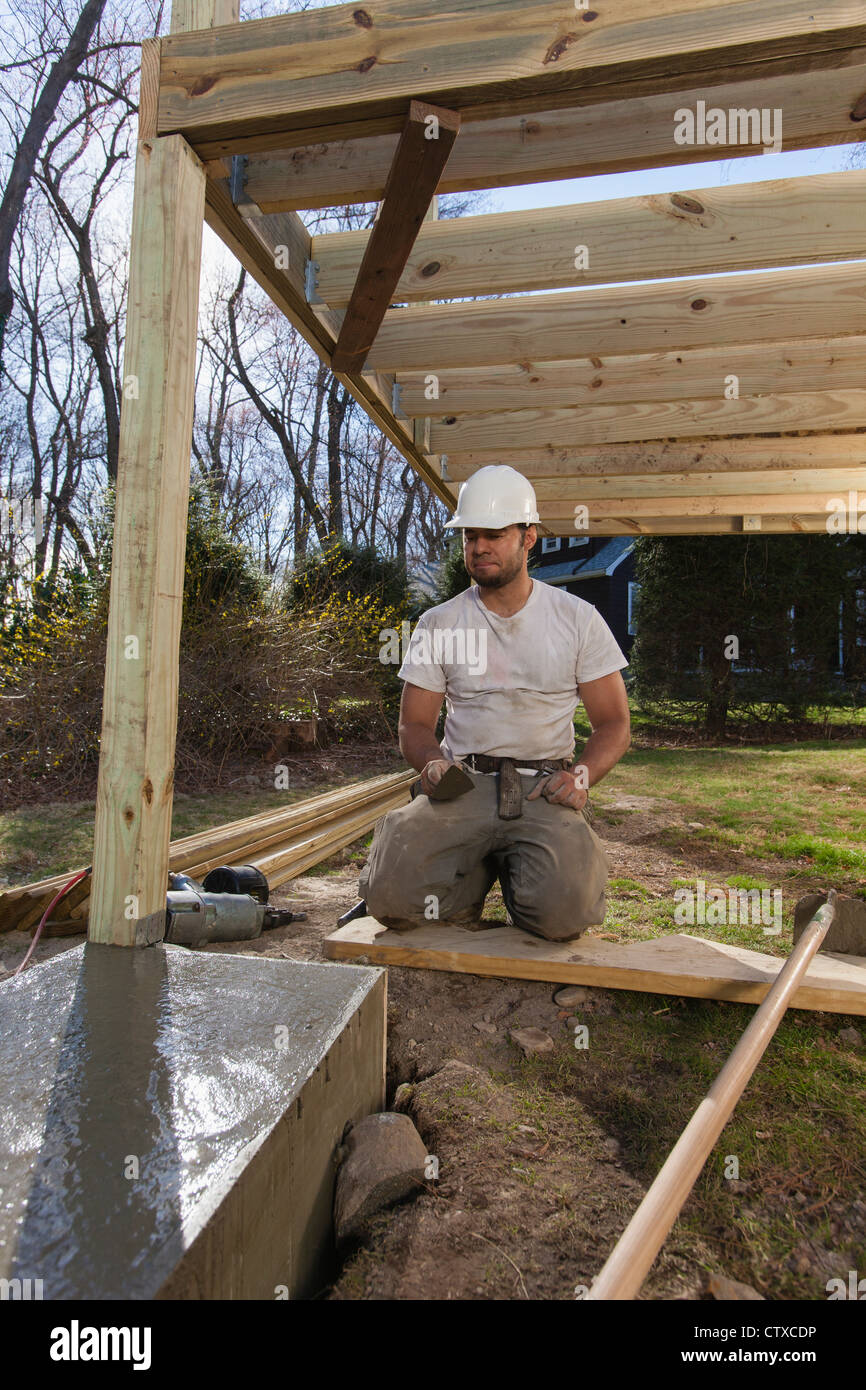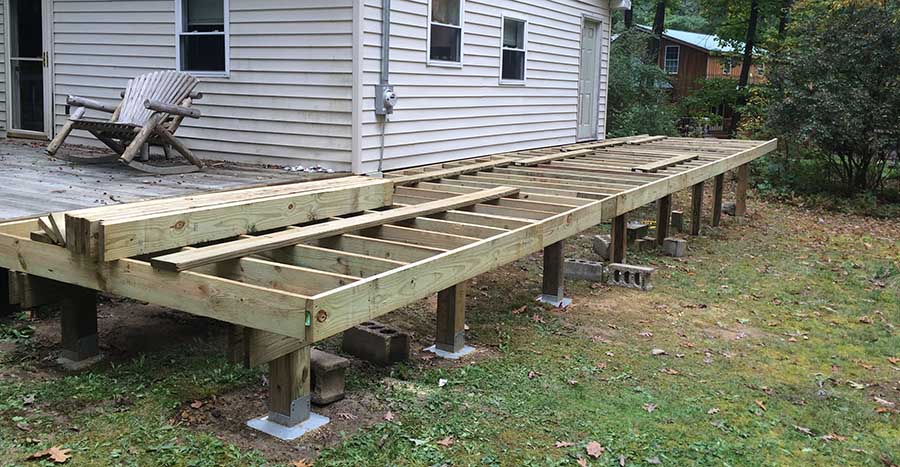Selecting the Right Deck Footings for Security and Toughness
When it comes to constructing a deck, among the most crucial choices you will make is picking the best grounds for security and durability. The longevity and safety and security of your deck depend heavily on the kind of footings you choose, as they give the essential support and stability to endure the examination of time. With a myriad of options readily available, it can be overwhelming to determine which grounds are best matched for your particular requirements. In this conversation, we will certainly check out the various kinds of deck footings, consider the vital aspects to evaluate when making a choice, and look into the advantages and disadvantages of different alternatives. By the end, you will certainly have a more clear understanding of the options available and be better geared up to make an educated choice for your deck project.
Types of Deck Grounds
There are a number of sorts of deck footings that can be used, each offering unique benefits and considerations. One usual kind of footing is the concrete pier footing. These footings are composed of a round opening full of concrete, which gives a strong foundation for the deck articles. Concrete pier footings are fairly simple to install and supply excellent security, making them a popular option for many deck tasks.
These footings are mounted by screwing them right into the ground, which develops a protected structure for the deck. They likewise allow for easy change and progressing of the deck if required.
Alternatively, some contractors choose precast concrete footings. These grounds are constructed from sturdy concrete and can be found in different sizes and shapes to suit various deck styles. Precast concrete footings are hassle-free to set up and offer a stable base for the deck structure.
Finally, another alternative is the post-in-anchor footing system. This kind of ground entails driving a steel anchor right into the ground and affixing it to the deck article. It supplies flexibility in regards to placing the deck blog posts and appropriates for decks with light-weight frameworks.
When selecting the appropriate type of deck ground, it is important to think about factors such as dirt conditions, deck tons, and local structure codes (Deck Footings). Consulting with an expert service provider or architectural designer can help ensure the proper footing is chosen for a secure and safe deck
Aspects to Consider When Choosing Footings
When selecting the proper grounds for a deck, it is essential to very carefully take into consideration various factors such as soil conditions, deck lots, and adherence to local building regulations. These aspects play a significant duty in making certain the stability and toughness of the deck framework.
One of the primary variables to consider is the dirt problems. The type of soil on which the deck will be developed determines the kind of footings needed. Decks developed on loose or sandy dirts might call for deeper grounds to supply ample assistance and stop settling. On the various other hand, decks improved clay or extensive soils may require grounds that can suit the soil's propensity to increase and agreement.
An additional vital factor is the deck tons. The weight of the deck, including the materials made use of and any type of prospective live loads such as furniture or events, must be taken into consideration when picking grounds. The grounds must be created to bear the weight of the deck and distribute it equally to stop any structural problems or failings.
Lastly, adherence to neighborhood structure codes is vital. Building regulations vary from region to region, and it is important to follow the details demands set by the local authorities. Deck Footings. These codes make sure that the deck is built safely and meets the necessary standards for structural honesty and load-bearing capability
Concrete Footings: Disadvantages and pros

When utilized as the structure for a deck,Concrete footings use numerous advantages and drawbacks. On the silver lining, concrete footings offer outstanding stability and longevity. Concrete is a strong and inflexible material that can support heavy tons and endure numerous weather condition conditions. It additionally has a long lifespan, making it a dependable option for lasting use.
Another benefit of concrete grounds is their versatility. They can be poured right into various shapes and sizes to suit different deck layouts and setups. Concrete grounds find out can be personalized to fit the specific demands and needs of the deck framework.
However, there are likewise some downsides to making use of concrete footings. One significant disadvantage is the expense and labor entailed in their installation. Concrete footings call for excavation and typically need the support of heavy machinery. This can raise the overall price of the deck job and might require specialist support.

Helical Piers Vs. Sonotubes: Which Is Better?
In taking into consideration the foundation alternatives for a deck, the contrast between helical piers and sonotubes is essential in identifying the remarkable option. They are twisted right into the ground using hydraulic machinery, providing a resilient and secure foundation for the deck.
The helical plates on the piers create a solid hold with the soil, shifting or protecting against any kind of motion of the deck. Sonotubes, on the various other hand, count entirely on the concrete filling for security, which might not use the exact same level of stamina and resistance.
In regards to installment, helical piers are reasonably much easier and faster to set up contrasted to sonotubes. The hydraulic machinery utilized to turn the piers right into the ground makes certain a quick and reliable procedure. Sonotubes, on the other hand, need digging openings and pouring concrete, which can be time-consuming and labor-intensive.
Furthermore, helical piers are a more flexible option. They can be used in various dirt problems and can be readjusted or reinforced if needed. Sonotubes, on the other hand, may require added assistance, such as rebar, in specific soil problems or locations with high tons requirements.
Picking the Right Footings for Your Deck's Measurements
For ideal architectural integrity, it is crucial to thoroughly pick the appropriate grounds that line up with the dimensions of your deck. The measurements of your deck, including its width, size, and height, play a substantial function in identifying the kind and size of footings called for.
When choosing footings for your deck, it is necessary to take into consideration the load-bearing capacity of the dirt. The weight of the deck, incorporated with the weight of any type of furniture or people on it, puts in a significant pressure on the grounds (Deck Footings). For that reason, it is vital to pick footings that can appropriately sustain this weight without changing or sinking in time.
Bigger decks with better measurements require larger grounds to offer enough security and assistance. The shape of the grounds, whether they are square or round, depends on the layout and design of the deck.
Conclusion
In verdict, selecting the right deck grounds is essential for making certain stability and longevity. Elements such as the kind of footings, the deck's measurements, and the pros and disadvantages of different alternatives need to be thought about.
These footings consist of a cylindrical opening loaded with concrete, which provides a strong foundation for the deck articles. Concrete pier grounds are relatively easy to mount and supply outstanding stability, making them a preferred selection for several deck tasks.
Precast concrete footings are convenient to set up and supply a secure base for the deck structure.
It offers versatility in terms of placing the deck blog posts and is ideal for decks with light-weight frameworks.
Concrete grounds use several advantages and disadvantages when utilized as straight from the source the foundation for check out this site a deck.